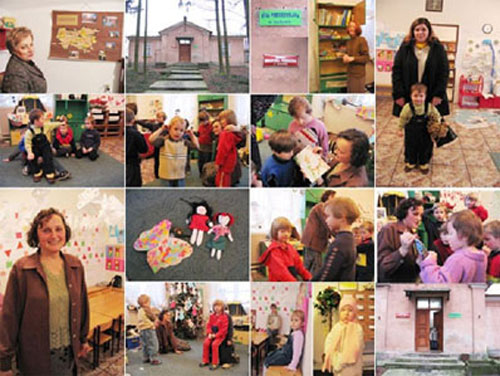COMENIUS KINDERGARDENS

Enabling pre school education in the poor rural areas where there are no kindergardens
Key Innovation
Educating children 3-5 years old from rural areas of high unemployment, by creating small kindergardens, which then become centers of local initiatives.
Problematic background and context
The “When There’s No Preschool” programme is carried out in the countryside, where only a small number of children aged between 3-5 years have the chance to go to preschool (according to studies, only 14%). This is due to the family’s lack of money (there is a high unemployment rate in the country), and the lack of preschool centres in the nearby area. According to legal statutes, the financial responsibility for education falls to the municipality, which frequently doesn’t have enough funds to finance the basic education. Preschool clubs ensure young children an equal start with their peers who have the chance to attend preschools. The solution can be applied in many municipalities, given its low costs (in comparison with average preschools). Children attend for only a few hours, which are used for education. Thanks to this programme, both the parents and the local governments co-operate to ensure young children receive essential education.
Solution description
This program came about through the co-operation of the J. A. Komenski Children’s Development Foundation. The goal of the program is to ensure a space and its upkeep, as well as pay for teachers. Educational materials, training and co-ordinator consultation (once a month) are ensured by the foundation. The teachers, many of whom were previously unemployed, receive experience thanks to the training and establish the ongoing program. The parents actively help: in renovating (adopting) the location decided upon by the municipality for the “Preschool Club,” as well as in equipping, organisational work, creating toys (plastic toys are rarely used). Parents have the opportunity to take part in the classes, in which each child participates as they please. The classes take place in groups of 10-12 people, divided by age; 12-16 hours weekly. Education through “concentrating on a theme” is an innovative form of learning, such as the “everything about hair” lesson, combined with a trip to barber.
Timeframe
The Preschool Club goes year-round, with a break for summer.
Development phase
Diffusion:
At first there were 4 Preschool Clubs in Jastków, with five groups of children; at the present time there are 7 schools with 8 groups. The Preschool Clubs have been started up in 8 municipalities, totaling 37 centres. The solution is very flexible, thanks to which it can be adapted to suit the needs of any municipality (for each location there is a different method of financing and hiring the teachers).
Maturity:
The teaching methods are continuously adapted, thanks to monthly exchanges of experiences, training etc.
Revenue/costs model
The cost of taking care of one child is 70 zl. per month (a normally village preschool costs 400 zl.). The municipality ensures the space and its equipping, as well as teachers’ salaries. The foundation pays for a quality consultant and didactic aid. Other costs (e.g. car rental for field trips) are paid by the parents or sponsors. Parents can additionally pay a small charge for materials.
Social evaluation
Thanks to the centre a coalition has been established between the parents and the local government, which gives the residents more confidence and increases their participation in the community life. The situation of the centres is also an important factor; e.g. nearby to libraries, which encourages the parents to check out books. Spending over a dozen hours a week at the clubs, they can also learn from each other. The parents share responsibilities, such as cleaning and shuttling children, for which they are given shifts. These centres socialise both the children and the parents.
Environmental evaluation
Plastic toys are generally not used in the clubs; these are mostly toys made by the parents: rag dolls, sock hand puppets etc. Moreover, the toys offered to the children are easy to make at home using scraps or other material frequently available, such as angels made from toilet paper rolls. The paints and pulp the children use can be made from organic ingredients such as salt, paper mache etc.
Economical evaluation
The initiative has an effect on the local job market, i.e. in hiring unemployed teachers and additional hours for the library staff. Making use of free building space, co-operation with parents, the development of points concentrating the cultural life of the area, and low operating costs are only some of the factors which decide the success of this undertaking.
Authors
Ela Tłuszcz /Academy of Arts in Cracov / Poland